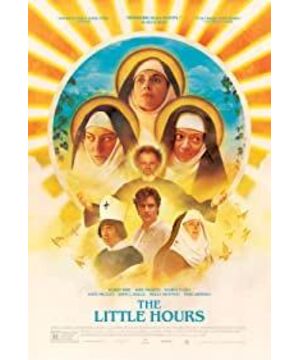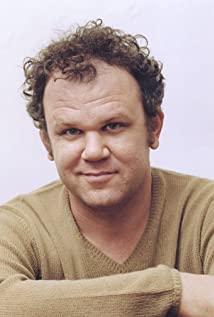Before starting today's article, Uncle Jun would like to ask everyone a question: How do you translate "The Little Hours"?
little time? small hours? Emmm, you can tell at a glance that you have learned English in vain for so many years!
If there is a cultural point, it should be translated as "bits of time". If you have a bigger brain, it is not impossible to translate it into "Crazy Monastery" or "Lust Monastery" .
Hmm... Uncle Jun admitted that I was attracted by the name "Lust Abbey" , which was very refreshing and refined at first glance, so I clicked to watch it.
However, watching it made me love it and hate it.
Looking forward to the full screen of white flowers... No, I am worried about the shameful movie that needs to be watched with headphones... No.
It turns out that you film translators are also so headline-grabbing, you learn! Bad! !
The story takes place in the Middle Ages, and the hero is Masetto, played by Dave Franco, a servant of the local aristocracy.
Maybe because he was handsome and good-looking, he successfully hooked up with the owner's wife, and he didn't forget to flirt with his wife in front of the owner during dinner.
It's also strange that the hostess needs too much, and she always wants to have a shot with Masaito. Finally one day, they were discovered by their master when they tried to fight against the wall.
The owner found out that he was green, and only said one sentence: go and fetch the eggs for me .
So the funniest scene of chasing and killing Xiaosan in history was staged:
" It's fortunate that you run fast, otherwise I'll shoot you to death... "
Just as Masetto was worrying about where to stay at night, he saw a priest crying by the river. It turned out that the priest drank some wine when he went to sell silk fabrics, the car overturned, and the things were scattered in a river.
The kind Masaito helped the priest fish up and repair the carriage. The priest agreed to take him in and said that he could live in the monastery, just as the monastery was still short of a handyman.
But is that the truth of the matter?
Let's go back to the beginning of the movie. The three heroines in the movie are three nuns, but none of them are fuel-efficient lamps.
The former handyman greeted them kindly, but was scolded by them with F**k and S**t.
For no reason, he was used as a punching bag, smashed by potatoes, and spat on. This is the truth of the lack of handymen in the monastery.
Masetto is going to enter such a monastery, and it is conceivable that his life will not be easy. However, he was unexpectedly popular in the convent: drinking with the priest, daring and shy with the nun .
The former handyman must have thought like this at this time: I have a sentence mmp I don't know if I should say it or not!
There are reasons for Masetto's popularity in the monastery: First, he helped the priest and helped the priest to hide the fact that the silk fabric fell into the river. This is equivalent to having a backer in the monastery, otherwise the priest would not look for him every day. Drink to please Maseto.
The second reason is simple: because Masaito is handsome!
Former handyman: I have another sentence mmp I don't know if I should say it or not!
Regarding the plot, Uncle Jun will not do more spoilers. Let's analyze the whole film and each character in the film in detail.
Leaving aside the name of the movie (sucking people, take off your pants, show me this?) First of all, looking at the whole movie, the movie gives Uncle Jun more a sense of black humor, or a late humor. feel.
For example, in the scene where they spat at the former handyman and insulted him, the nun on the right raised a piece of wood and smashed it to the ground angrily. Humor or some other lens design sometimes requires us to react to get it.
It doesn't have a lot of straight-forward funny plots. This kind of black humor, which is more preferred by Westerners, is actually rooted in cultural differences.
In addition, some elements of the film with the theme of monasteries, the Middle Ages, priests, nuns are also quite ironic.
A nobleman with a big castle has only two soldiers in his entourage, and this nobleman is still a stupid and incompetent image, which is also a symbol of the decline of the Middle Ages.
The monastery was originally a sacred, rigorous and solemn place, but in the movie it is a place full of worldly flavors;
The priest was supposed to lead by example, the image of the messenger sent by God, but in the movie he was an alcoholic with a serious mouth, but in private he lived a secular and lovely life;
And the protagonists in the movie, the nuns, are supposed to dedicate themselves to God and have no selfish desires. But one by one is suffering from repressed emotions and desires with nowhere to vent.
In this case, the name of the movie " The little hours " can also be understood. Little hours in Roman Catholicism means a daily routine prayer class.
The use of this as the title of the movie also has two meanings. First, the use of a routine prayer class to represent the entire film and television is enough to show that the movie is boring;
Another implication is that the nuns did not fully follow the canon to conduct regular prayer lessons. The absurd things that happened in the movie can be explained by the beautiful word "bits of time".
The final ending of the film has a sweet taste: although such absurd things happened in the monastery, and the bishop punished the parties involved, everyone could see the repressed life in the future at a glance, and they "resisted":
The abbot bravely eloped with the priest in spite of the punishment, and the imprisoned Masetto, who was sent back to the noble owner, was also rescued by three crazy nuns, and returned to the monastery to live happily without shame. Life.
Uncle Jun has always been opposed to the behavior of "preserving the principles of nature and eliminating human desires", but throughout the ages, are there still few things that have gone through all kinds of emotions and six desires under the guise of religion? Although these are all from unofficial history, novels and the like, I believe that "the ancients did not deceive me! ".
View more about The Little Hours reviews











